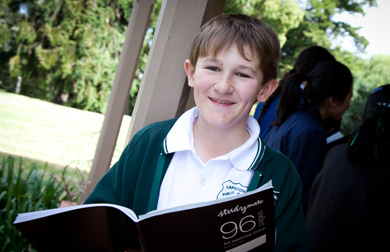Year 5/6 winner: Alexander Husarek, Lapstone Public School

“Language is the inventory of human experience”, L W Lockhart
Each morning in my home begins with a conversation between many people. “Get out of bed!” “Hurry up, you’re going to be late” “Do I have to go today?” Our language enables us to communicate our thoughts, our desires and our hopes. Language is the basis of my human experiences. It is the register of my days past, my present and the thoughts of the future. It is the record of my thoughts. Language connects me to the people around me – my family, my friends, and allows me to even connect with those people I do not know. But what happens when your language is lost? When your language is not kept alive or it has not been cultivated? What happens to those people’s shared experiences? What happens to a community that can no longer connect or communicate in their Indigenous language with each other?
Before the British invasion of 1788 there were over two hundred and fifty Aboriginal languages spoken throughout Australia. That number has dramatically declined by half. That is over one hundred and twenty communities that no longer have an inventory of their shared human experiences. One hundred and twenty communities that have lost a significant part of their past and no longer have their oral history through storytelling or language. Of those remaining languages many of them are critically endangered. The Northern hairy-nose wombat is also on the critically endangered list and seems to attract more attention than that of the Aboriginal languages that will soon become extinct. What can we do to halt this decline in numbers of Aboriginal languages?
Each year throughout Australia students are taught German, French, Indonesian and Italian just to name a few. But why aren’t students taught their local Indigenous language – a language that could be enhanced through the shared communication between Indigenous and non Indigenous children. The language of the Darug people, the people whose land our school stands on today, is nearly extinct. Our efforts in school language lessons could be crucial in the revival of the Darug language. Schools could promote their local traditional language and renew the oral traditions that are so important to the Aboriginal human experience. School language programs could renew a critically endangered language.
In New Zealand the government has worked tirelessly to strengthen the Maori language for native and non native speakers. This has dramatically increased the number of children who now have a language experience to build on. Maori language is promoted and celebrated. Maori language is embraced. The time has come. Our education leaders need to make changes to our school language programs so that future generations can listen to, hear and share their local Indigenous language as a shared language. In the future we will be able to recall the story of our Indigenous communities together.
To be able to awake from my slumber and greet my family, not in German or French but rather in the Darug language would be a privilege. To share in Aboriginal oral history through Indigenous languages would certainly construct human experiences for me with the culture of the first people of our land.
Mobile options:




